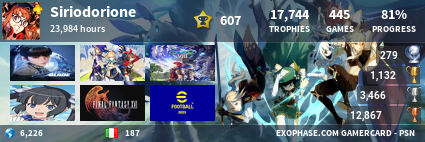So lessons learned by, say FF12 were not bequeathed to the FF13 team at all, and the 13 lessons weren't given to FF15 at all, etc. One thing I have never been able to figure out is if it's a bug or a feature of their corporate structure, but the teams are all but antagonistic to each other to some degree. Which is how you ended up with stuff like that ridiculous season where SE released like ten smaller games in one six month period -- it was individual top-level producers deciding their planned release windows, then refusing to move, and nobody central putting their foot down and going, "we should all spread out". Or announcing Rebirth in the middle of the FF16 promotional cycle (FF7 25th or not, they should've let 16 breathe), etc.
You do get sharing, but it's within bubbles. FF7 and KH have existed in the same bubble, for instance. It's not exactly a secret, but it's also not hugely public knowledge, but as an example Naoki Hamaguchi (Rebirth director) actually hopped over to KH3 when it was in the crunch phase to help it to ship. Because those teams/divisions have shared leaders & values. Which is pretty normal in games - if you look at 'golden age' BioWare, the Mass people would jump over to DA to help DA ship at the crucial times, and vice versa. But there was zero chance of (m)any people from FF7R hopping over to FF16 to help it ship due to how SE is structured.
Not sharing in that way is -- it's become a blocker to SE, it's slowed them down, it's worked against them. For the antithesis of this approach, look to Capcom where the engines are shared and everyone knows what everyone else is doing. When I was in Osaka last year for a few days sitting in Capcom's HQ to watch the MH Wilds dev team at work and play the game, those guys were telling me about occasions when they thought of something they needed for MH Wilds iN RE Engine and then they'd realize another team had already made it, saving them loads of time & man hours. So there's that literal collaboration, but also a cultural collaboration - the cultures presided by say Yoshida and Kitase/Nomura are wildly different. Culture between teams is going to differ a bit, but I could tell you what the 'Capcom Culture' is broadly, as a wider company, but I don't think you could define SE in that way very easily at all.
I guess that is partially by design, is it's that which allowed FF to change so dramatically game-to-game, and it probably can be traced back to Sakaguchi splitting his proteges in two - after FF6, its two directors were split for their next big project. You get the Kitase-led thread (7>8>10/KH>13>7R, with a small amount of Versus-related splintering off to 15/Luminous) and the Ito thread (Tactics>9>12... and then this one peters out. And of course you had the third string, which was Tanaka (11>14 1.0). But the problem in a sense was two of the threads died - Tanaka's was severed with the disaster of 14 (and replaced by Yoshida's vision, which is great) and Ito's just sort of petered out and much of what that side represented has now been scattered among various groups (ie all things Ivalice have ended up with Yoshida; FF9 is now the baby of a smaller group). The thing is they also became more siloed over time. If we look at that PS1 era, systems-nerd Ito was consulted on and helped them to outline Materia before he went off to Tactics, and he had a similar role as they were figuring out Triple Triad and the Junction System. But the last 15+ years, everything has been much more rigid.
Anyway, I digress. Rambling. But more collaboration and communication between discrete teams is something the new CEO has specifically outlined as a goal of the new corporate structure, and hopefully this means the sort of lessons Yoshida is talking about can be fully and properly shared between all the teams.





